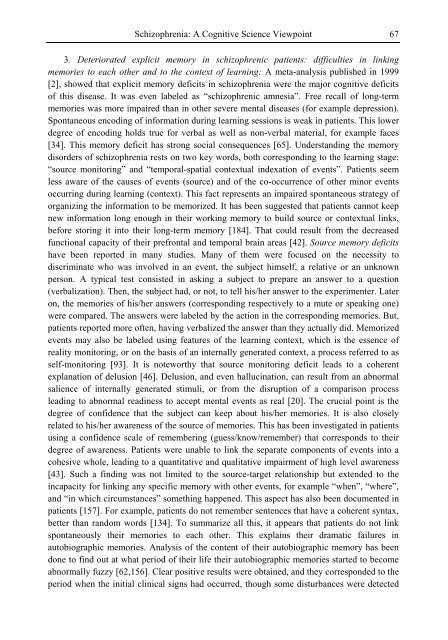Schizophrenia Research Trends
Schizophrenia Research Trends
Schizophrenia Research Trends
- No tags were found...
You also want an ePaper? Increase the reach of your titles
YUMPU automatically turns print PDFs into web optimized ePapers that Google loves.
<strong>Schizophrenia</strong>: A Cognitive Science Viewpoint 673. Deteriorated explicit memory in schizophrenic patients: difficulties in linkingmemories to each other and to the context of learning: A meta-analysis published in 1999[2], showed that explicit memory deficits in schizophrenia were the major cognitive deficitsof this disease. It was even labeled as “schizophrenic amnesia”. Free recall of long-termmemories was more impaired than in other severe mental diseases (for example depression).Spontaneous encoding of information during learning sessions is weak in patients. This lowerdegree of encoding holds true for verbal as well as non-verbal material, for example faces[34]. This memory deficit has strong social consequences [65]. Understanding the memorydisorders of schizophrenia rests on two key words, both corresponding to the learning stage:“source monitoring” and “temporal-spatial contextual indexation of events”. Patients seemless aware of the causes of events (source) and of the co-occurrence of other minor eventsoccurring during learning (context). This fact represents an impaired spontaneous strategy oforganizing the information to be memorized. It has been suggested that patients cannot keepnew information long enough in their working memory to build source or contextual links,before storing it into their long-term memory [184]. That could result from the decreasedfunctional capacity of their prefrontal and temporal brain areas [42]. Source memory deficitshave been reported in many studies. Many of them were focused on the necessity todiscriminate who was involved in an event, the subject himself, a relative or an unknownperson. A typical test consisted in asking a subject to prepare an answer to a question(verbalization). Then, the subject had, or not, to tell his/her answer to the experimenter. Lateron, the memories of his/her answers (corresponding respectively to a mute or speaking one)were compared. The answers were labeled by the action in the corresponding memories. But,patients reported more often, having verbalized the answer than they actually did. Memorizedevents may also be labeled using features of the learning context, which is the essence ofreality monitoring, or on the basis of an internally generated context, a process referred to asself-monitoring [93]. It is noteworthy that source monitoring deficit leads to a coherentexplanation of delusion [46]. Delusion, and even hallucination, can result from an abnormalsalience of internally generated stimuli, or from the disruption of a comparison processleading to abnormal readiness to accept mental events as real [20]. The crucial point is thedegree of confidence that the subject can keep about his/her memories. It is also closelyrelated to his/her awareness of the source of memories. This has been investigated in patientsusing a confidence scale of remembering (guess/know/remember) that corresponds to theirdegree of awareness. Patients were unable to link the separate components of events into acohesive whole, leading to a quantitative and qualitative impairment of high level awareness[43]. Such a finding was not limited to the source-target relationship but extended to theincapacity for linking any specific memory with other events, for example “when”, “where”,and “in which circumstances” something happened. This aspect has also been documented inpatients [157]. For example, patients do not remember sentences that have a coherent syntax,better than random words [134]. To summarize all this, it appears that patients do not linkspontaneously their memories to each other. This explains their dramatic failures inautobiographic memories. Analysis of the content of their autobiographic memory has beendone to find out at what period of their life their autobiographic memories started to becomeabnormally fuzzy [62,156]. Clear positive results were obtained, and they corresponded to theperiod when the initial clinical signs had occurred, though some disturbances were detected
















